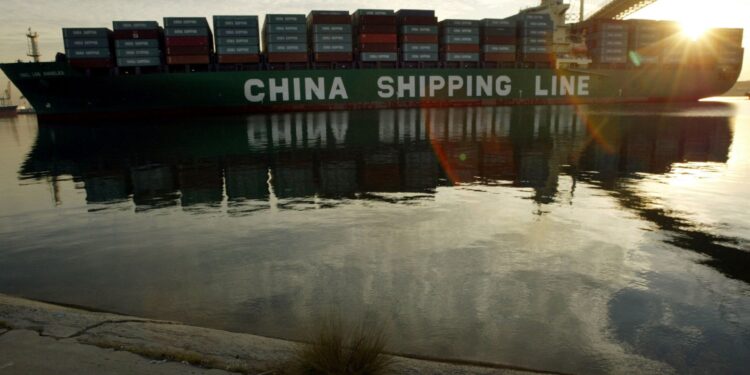4/18/2025–|Last update: 4/18/202510:52 PM (Mecca time)
The United States has announced through the US Trade Representative Office to impose new customs duties on China ships, whether it is manufactured in China or owned and managed by Chinese parties, in an attempt to revive the shipbuilding industry inside the United States and reduce Chinese hegemony over this strategic sector.
These drawings are scheduled to enter into force within 180 days, according to the French Press Agency.
Details and temporal structure
The French Agency stated that these fees will be imposed on Chinese ships or associated with China only once for each trip to the United States, provided that the number of fees imposed on one ship does not exceed 5 times a year, and the procedures include:
- Imposing a fee of 50 US dollars per pure ton of goods on the ships associated with China, with an increase of $ 30 annually over the next three years.
- For the manufactured ships in China, a $ 18 fee will be imposed per net tons or $ 120 per standard container, with similar annual increases.
- Non -American ships that transport vehicles will undergo a $ 150 fee per unit.
- Foreign ships that transport LNG will face additional restrictions 3 years after the start of implementation, and these restrictions will gradually increase for 22 years, as the BBC said that these fees are less severe than a previous proposal circulated last February, which included imposing fees of $ 1.5 million per visit by a Chinese ship to a US ports.
Declared exemptions
According to the BBC, the empty ships coming to the American ports to load exports such as coal or grains, as well as ships that transport goods between American ports or from those ports to the Caribbean islands and the United States will be exempt from the fees.
American and Canadian ships operating in the Great Lakes region were also relieved.
Chinese and international reactions
In the first official comment, Chinese Foreign Ministry spokesman Lyn Jian said that these fees “will be harmful to all parties,” adding that the United States “raises global shipping costs and threatens stability of production and global supply chains,” according to the French Press Agency.
The Chinese official added that this step “will not succeed in reviving the American shipbuilding industry.”
American business unions representing about 30 economic sectors warned that these measures, albeit beneficial to the shipbuilding industry, but will negatively affect many sectors, especially agriculture and manufacturing industries, and may lead to high prices of commodities for the American consumer, according to the same source.
Commercial backgrounds and continuous customs escalation
The move comes in the context of the escalation of the trade war between Washington and Beijing, and former US President Joe Biden has assigned the Commercial Representative Office to investigate the “unfair practices of China” in the areas of shipbuilding, logistical services and marine shipping, and the current President Donald Trump kept this investigation and expanded it, declaring last March the establishment of a private shipbuilding office that follows directly to the White House.
Commenting on this policy, White House Trade Representative Jameson Ghrir said that “ships and maritime trade are a pillar of American economic security,” adding that the goal is to “turn Chinese hegemony and send a clear message about the American demand for locally manufactured ships.”
The United States has lost its leadership position in the shipbuilding industry since the end of World War II, and today it constitutes only 0.1% of global production, while China acquires approximately 50% of the shipbuilding market advanced on South Korea and Japan, according to data of the United Nations Trade and Development Conference.
An increasing global effect on shipping movement
The British Broadcasting Corporation indicated that these new drawings come at a time when global trade is exposed to great fluctuations due to the customs tariffs that Trump has imposed since his return to the White House last January.
The Trump administration raised customs duties on some Chinese imports to 145%, and is expected to reach 245% when combining new fees with the old.
The BBC quoted the Organization of the Institute for Export and International Trade that these policies converted the destinations of many Chinese ships that were heading to American ports towards Europe, causing great crowding in ports such as Felixo in Britain and Rotterdam in the Netherlands and Barcelona in Spain.
The President of the Flex Ports Company for Logistics Services Sante Manders said that the first quarter of 2025 witnessed a 15% increase in China’s imports to the United Kingdom and 12% to the European Union, referring these numbers to the US customs duties policy.
Manders explained that these moves may push companies to redesign global supply chains, in search of alternative markets or opportunities to circumvent American fees, stressing that the American consumer will be the first to pay the price of these policies through high prices.



